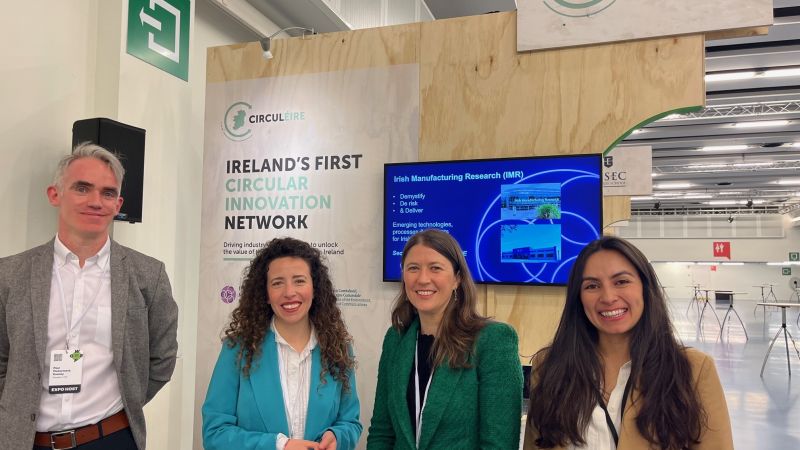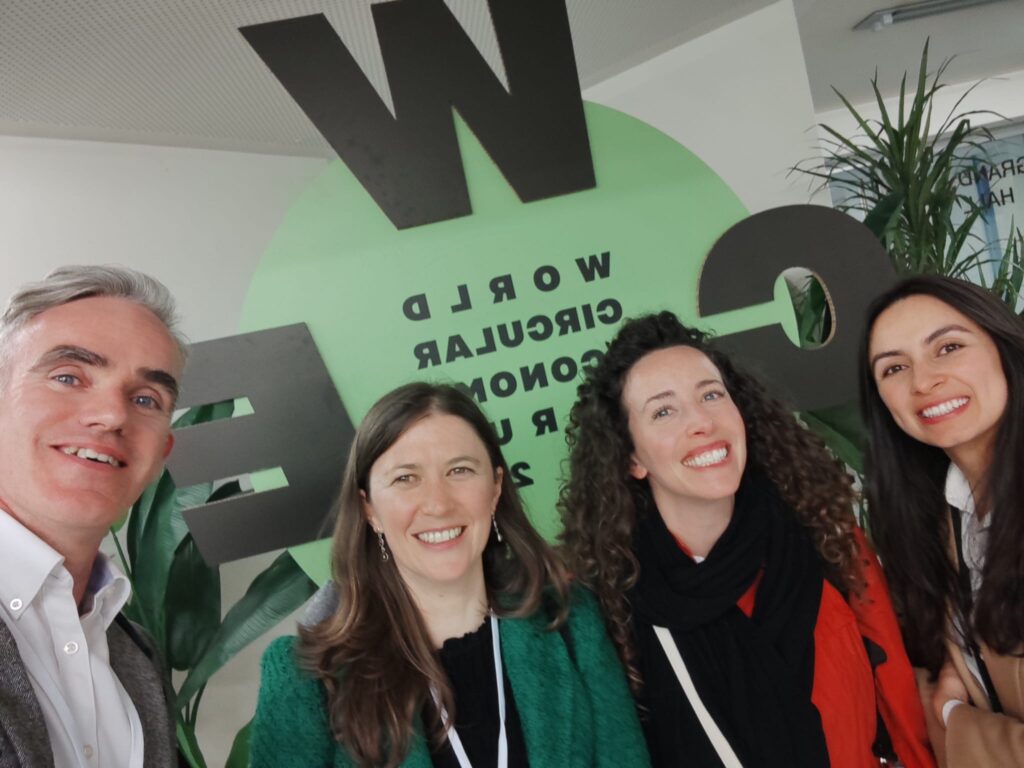Highlights from The World Circular Economy Forum in Brussels April 15th & 16th.

Earlier this month, the WCEF2024 brought more than 1,500 frontrunners of circularity to Brussels, Belgium. The event was followed online by almost 8,000 people around the world from 158 countries. The forum, which took place in Brussels 15-18 April 2024, highlighted the importance of the EU’s role in accelerating the transition to a circular economy globally.

A delegation from CIRCULÉIRE lead by Dr Geraldine Brennan Geraldine Brennan, PhD with Paul McCormack-Cooney Valentina Rangel Leon Agnese Metitieri on behalf half of IMR and CIRCULÉIRE members were present across the week.

As one of a selected 40 exhibitors at the WCEF Expo the team engaged with European counterparts for a week of knowledge exchange sharing insights and case studies on best practice for how circular innovation is progressing among CIRCULÉIRE members in Ireland. We forged relationships to nurture current and future opportunities for European collaboration for our members.
We were particularly delighted to welcome Ireland’s Minister for the Circular Economy Ossian Smyth to our #WCEF2024 Expo stand to discuss the opportunities for further collaborations for Irish Industry across the international Circular Economy Ecosystem.

The Macro View
The macro messages from CE experts highlighted the importance of a pan European approach, global collaboration and strong regulatory frameworks. The time for talking is over and today, the implementation of circularity is crucial for securing economic prosperity and unlocking well-being by reducing the overuse of non-renewable natural resources.
There is a firm belief that : “Developing the EU’s single market to support circularity would create new business opportunities, jobs and security for all Europeans. This would strengthen the EU’s strategic autonomy and competitiveness. It would also send a powerful signal of a predictable investment environment,” as outlined by Atte Jääskeläinen, President of the Finnish Innovation Fund Sitra, the initiator of the WCEF.
For Ivonne Bojoh, CEO of Circle Economy Foundation, Radical global collaboration was cited as“ fundamental in driving the transition at the speed and scale necessary” . Indeed, the need for collaboration between the global North and South was emphasized by various speakers. Climate change is a universal challenge, and the regulatory initiatives undertaken by Europe will have far-reaching implications across the entire value chain, with repercussions extending to Southern Hemisphere nations.
Ali-Hamndou Dorsouma, Division Manager, Climate Change & Green Growth, African Development Bank Group (AfDB) reflected on how they are going “… beyond mainstream lending practices to foster circular implementation across the continent through a comprehensive package policy support, finance support, technological support through the African CE Facility…” he also highlighted that the AFDB recognise the importance of supporting circularity in an integrated way cross-sectorally.
Moreover, there was recognition that whilst implementation supports are crucial, bilateral knowledge sharing and learning from indigenous communities with deep-rooted insights into circular economy practices are essential to ensure implementation is context-attuned and doesn’t create or contribute to negative unintended consequences.
In terms of policy, the message resonated clearly: Europe has set an ambitious circular economy policy framework, and now it’s time for its implementation and enforcement. In this next phase, industry engagement along with robust support mechanisms to facilitate the transition is essential to set new rules of the game.
Day 1 – Replacing the linear growth model with circular models.
Day#1 of World Circular Economy Forum WCEF opened with the stark reminder from Janez Potocnik, International Resource Panel (IRP) that unsustainable resource use is driving the triple #planetarycrisis (climate, biodiversity and pollution) and that our economies were invented to serve humans not the other way around.
Watch here Turning circular visions into actions – WCEF2024
The International Resource Panel (IRP) launched the Global Resource Outlook #2024 -that highlighted that based on current trends, world consumption is predicted to increase by 60% by 2060 compared to 2020 levels. Hence the urgency to accelerate efforts to use circular economy to decouple resource use from wellbeing, economic activity and environmental pressures and impacts. This breakthrough report from the UNEP-convened International Resource Panel shows that it is possible, and profitable, to decouple economic growth from resource use and the environmental impacts they cause. The report stressed
“ We are talking about replacing the prevailing linear growth model with sustainable and circular models: systems that keep materials, once extracted, in use for as long as possible by rethinking how we design and deliver goods and services. Circularity and more sustainable and resource-smart ways of provisioning basic services are needed in the areas of housing, food and mobility, among others. If we do this, we can create new business models, reduce environmental impacts and slash resource use in wealthier countries “ .
READ HERE Global Resources Outlook 2024 | UNEP – UN Environment Programme
One of the primary challenges for establishing a circular economy is mobilising capital fast enough to halt the triple planetary crisis. At the 2023 World Circular Economy Forum in Helsinki, a working group comprised of senior representatives of the Multilateral Development Banks (MDBs) was established to explore how we can rise to that challenge. The role of the MDBs is to invest public money, prioritising development over profit. The MDBs prioritise investment where the private market is failing. The MDB working group will focus on:
- Strengthening internal capacity to continue our demand-based support to circular economy approaches, both within our lending and our advisory activities.
- Exploring methodologies to demonstrate how circular solutions can generate economic value while fostering a just and inclusive sustainable development.
- Enhancing resource efficiency considerations within our operations across sectors
- Facilitating the exchange of knowledge with the private sector, civil society, and local, regional, and national authorities.
At the Shaping a global vision for circular finance session, senior representatives from the African Development Bank (AfDB), the European Bank for Reconstruction and Development (EBRD), the European Investment Bank (EIB), the Inter-American Development Bank Invest (IDB Invest) and the World Bank, came together to launch A Shared Vision For The Circular Economy.
Watch Here European and global perspectives on policy, investment and innovation – WCEF2024
Day 2 – Designing peaceful global partnerships.
Day#2 saw another stellar line-up & thought provoking kick-off by Olivia Lazard, Patrick Schröder, Emily Barran, EDNA KAPTOYO & Slendy Díaz’s in the opening plenary “Ensuring a Peaceful Circular Economy transition”, which stressed the need for partnerships between Global North & South to be intentionally designed to “remove the underlying structures and systems which contribute to local conflict” and “intentionally create more distributive systems which learn from indigenous communities”.
Watch Here Ensuring a peaceful transition – WCEF2024
Hannah Ballard Director Sustainable Change Studio and Peter Schmidt NAT Section President European Economic and Social Committee (EESC) closed the conference on an optimistic note with some key takeaways for policy makers, industry and CE investors.
- Have candid conversations with startups and investors on how Circular Innovation and entrepreneurship can be accelerated.
- Address new economic models & invest in system change.
- Continuous conversation and collaboration
Watch Here Rethinking our futures – WCEF2024
So what’s next …
- Jutta Urpilainen EU commissioner for International Partnerships announced the establishment of the EU Circular Economy Resource Centre to facilitate peer-to-peer exchanges and partnerships between EU and third-country stakeholders, fostering the uptake of sound circular economy policies and business models worldwide. The centre will be operational by the end of 2024.
- Alongside the centre, the EU also announced a five-year initiative “SWITCH to Circular Economy in East and Southern Africa”. With funding of €40 million euros, it will focus on promoting the transition to circular economies in the regions.
- A list of 30 European companies, unveiled at the World Circular Economy Forum 2024 in Brussels, shows how circular solutions can tackle biodiversity loss and unlock new business opportunities. Alongside the list, the Finnish Innovation Fund Sitra released a first-of-its-kind handbook for developing circular economy business models to deliver on nature targets. READ MORE
- The World Circular Economy Forum 2025 will be held in São Paulo, Brazil, from 13 to 14 May 2025. It will be the first time the forum enters Latin America, where the climate and biodiversity negotiations between 2024 and 2025 will also take place, offering an opportunity to strengthen global collaboration and get businesses onboard to build a circular economy future. The WCEF2025 will be hosted jointly by the Federation of the Industries of the state of São Paulo (FIESP), the Brazilian Trade and Investment Promotion Agency (Apex-Brasil), the Brazilian National Confederation of Industry (CNI) and the Finnish Innovation Fund Sitra, the initiator of the forum.
Key Links
The World Circular Economy Forum (WCEF) creates a new economy, businesses and jobs, by leveraging circular solutions to solve the planetary crises. Since 2017, the forum has gathered forward-looking thinkers and doers to showcase and enact the world’s leading circular economy solutions. WCEF is a global initiative of Finland and Sitra, the Finnish Innovation Fund. WCEF2024 is organised by Sitra and produced with Circle Economy Foundation (programme partner) and the International Resource Panel (science partner), in close collaboration with international partner organisations.
The Finnish Innovation Fund Sitra is an active fund for the future. It aims to create a fair and sustainable future and work with partners to ensure that Finland can lead the way in the transition to a fair and competitive carbon-neutral circular economy – a new society in which our everyday lives and well-being are no longer based on excessive consumption and fossil fuel use. Sitra was founded in 1967 and is an independent public fund operating directly under the supervision of the Finnish Parliament.
The International Resource Panel was launched by the United Nations Environment Programme in 2007 to build and share the knowledge needed to improve our use of resources worldwide. The Panel consists of eminent scientists with expertise in resource management issues. It studies key questions around global resource use and produces assessment reports that distill the latest scientific, technical and socio-economic findings to inform decision-making.
Circle Economy Foundation is a global impact organisation with an international team of passionate experts based in Amsterdam. We empower industries, cities and nations with practical and scalable solutions to put the circular economy into action. Our vision is an economic system that ensures the planet and all people can thrive. To avoid climate breakdown, our goal is to double global circularity by 2032.
SHARE
‘About CIRCULÉIRE

